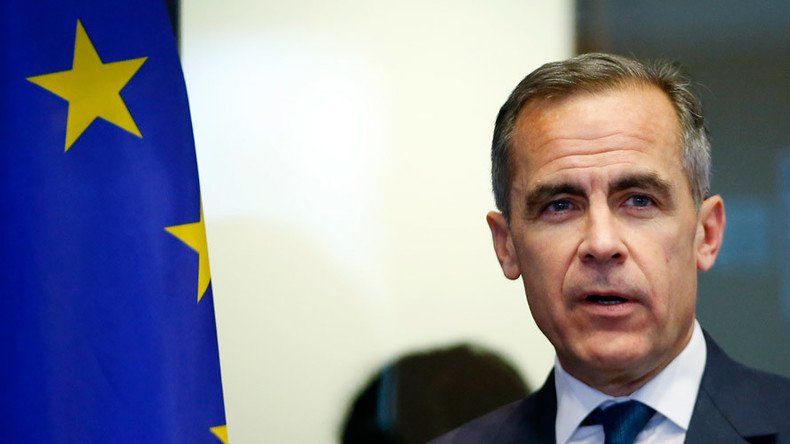Billions of pounds flooded into UK banks to stave off Brexit panic

Bank of England (BoE) Governor Mark Carney is taking emergency steps to prepare for a Brexit by flooding UK banks with billions of pounds of cash.
The BoE will offer banks as much money as they need in a bid to bolster liquidity each week in the three weeks preceding the June 23 referendum and one week following the poll.
Pro-EU campaigners and allies of Chancellor George Osborne insisted the move was “not choreographed” with the Treasury, while Brexit campaigners claimed Prime Minister David Cameron and Osborne are manipulating the central bank.
Similar measures were taken by the BoE around the time of the Scottish independence referendum, it was later revealed, and during the 2007-2008 global financial crisis.
GO, GO leaflet drop: Galloway & Farage team up for massive Brexit campaign day of action https://t.co/eG8x0OF9vUpic.twitter.com/NBqPw59wK4
— RT UK (@RTUKnews) March 4, 2016
Index Long-Term Repo – as the scheme is known – is normally used once a month to help banks with liquidity. The BoE lends a few billions pounds to the banks, although the figure can vary greatly.
In a sign of unstable times, the central bank confirmed on Monday it will boost the number of loans to four – one every week – in the month of June.
Andrew Goodwin, of commercial venture Oxford Economics, said the move is a safety net intended to bolster confidence.
“It is a way to provide extra liquidity in the event of an emergency,” he told the Mirror.
“It is similar to in the credit crunch when there was a whole series of times when the Bank of England offered liquidity in the event that financial institutions needed it.
“It is a safety net, it is there just in case it is needed, but there is no guarantee it will be used. It is there to bolster confidence.”
Carney told MPs on Thursday that Brexit is the biggest domestic risk to financial stability the UK currently faces, warning that the City of London would lose business if the British public vote to leave the bloc.
The bank’s Governor was criticized by vocal Tory MPs for backing the ‘Remain’ campaign.
“You are doing your reputation and the reputation of the Bank harm,” Jacob Rees-Mogg MP told Carney.
He added that “it is beneath the dignity of the Bank of England” to push speculative arguments.
Rees-Mogg also said he feared Carney was being sucked into ‘Project Fear’ – the campaign to remain in the EU.
“It’s important he remains above the political fray or he will damage his own influence and the standing of the Bank of England,” he said.
Carney defended the bank’s role ahead of the June referendum.
Brexit better for Britain than toxic TTIP, says Joseph Stiglitz https://t.co/T6462IDXKQpic.twitter.com/RWII1DXqrr
— RT UK (@RTUKnews) March 3, 2016
“I have not spoken with the Prime Minister about what I might say about the EU,” he said.
However Carney gave tacit support for Cameron’s EU deal, which the Prime Minister claims will grant Britain special status in the bloc.
The bank’s Governor said Cameron’s deal addresses issues identified by the bank as necessary to secure Britain’s monetary and financial stability.
“The Settlement (reached by Cameron) explicitly recognizes the needs of the UK to supervise its financial stability, while not impeding the implementation of necessary, further integration amongst members of the euro area.
“It makes clear that the UK retains responsibility for supervising its financial stability, financial institutions and markets as well as maintaining responsibility for the resolution of failed financial institutions within its jurisdiction.
“It recognizes that there is more than one currency in the EU and makes a legally binding commitment to ensure non-discrimination in the single market on the basis of currency. Finally, it makes a series of commitments to improve the competitiveness of the EU economy - commitments, to the extent they are fulfilled, that would reinforce the positive impact of EU membership on the Bank’s secondary objectives,” he added.












